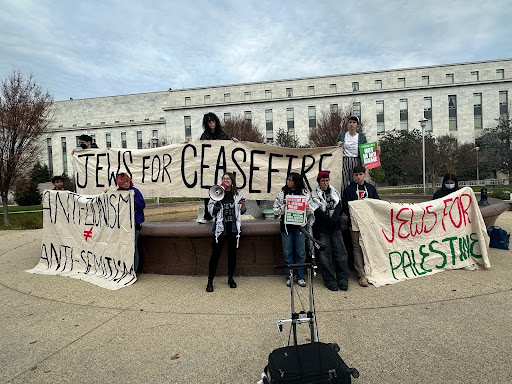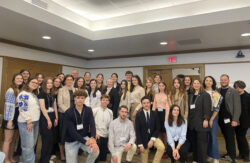Because of the documented harassment encountered by pro-Palestine activists, some speakers have chosen to stay anonymous.
On Tuesday Dec. 5, dozens of Jewish university students organized a rally and press conference in protest of a Congressional hearing on antisemitism and U.S. House Resolution 894 that equates anti-Zionism with antisemitism. Presidents of Harvard University, University of Pennsylvania, and the Massachusetts Institute of Technology were invited to testify about antisemitism on college campuses at the hearing.
Frustrated by the exclusion of their voices, students from Georgetown, George Washington University, Harvard, UPenn, M.I.T., Princeton University, Brown University, and University of Michigan traveled from their respective campuses to attend the action.
“Right inside that building behind us, they’re having a conversation without us,” a student organizer with Harvard Jews for Palestine, who chose to remain anonymous, said. “Most of our presidents haven’t talked to us at all, despite us begging as loud as we can for them to talk to Jewish students before they testify on antisemitism.”
Student speakers at the press conference refuted the claim that the hearing was supposed to address concerns of rising antisemitism on college campuses.
“The hearing today is not about protecting Jewish students. It is about bullying the leaders of prominent universities into silencing criticism of Israel,” Jack Starobin, a junior at UPenn and the spokesperson for Penn Chavurah, a progressive Jewish student organization, said.
Students expressed that the protection offered by their universities did not extend to anti-Zionist Jewish students participating in peaceful pro-Palestine protests on campus. On Nov. 8, 20 Jewish students at Brown were arrested after staging a sit-in to demand that their administration call for a ceasefire and divest from companies that profit from human rights abuses in Palestine.
“Instead of addressing BrownU Jews for Ceasefire’s demands, the university called for our arrest and threatened us with disciplinary action,” Samantha Bloom, a junior from Brown and a student organizer with BrownU Jews for Ceasefire Now, said. “The Brown administration and our campus Hillel have continued to ignore our existence as Jews because of our solidarity with our Palestinian peers.”
Over 75 Jewish and Israeli students and organizations from Harvard, M.I.T., and UPenn and other universities across the nation signed a statement that affirms their solidarity with Palestinian liberation. The statement reads that the “dangerous conflation” of anti-Zionism and antisemitism hinders effective discussions about the eradication of antisemitism.
House Resolution 894 passed later that day in a 311-14 vote, with 92 Democrats voting present. The resolution condemns all instances of antisemitism and defines anti-Zionism as antisemitism. Although House resolutions are not binding law, a month earlier, the House passed an amendment to an appropriations bill, to deny federal funding to any university that “authorizes, facilitates, provides funding for or otherwise supports any event promoting antisemitism.”
A key point at the protest was the organizers’ shared belief that antisemitism and anti-Zionism are distinctly different, and that equating the two is deeply harmful.
“It’s very disheartening to see that Zionism is being conflated with Judaism,” Lela Tolajian (SFS ’26), a founder of Georgetown’s chapter of Jewish Voice for Peace, said in an interview with the Voice. “As long as Zionism has been around, there has been Jewish resistance to it. But a lot of people are conditioned to wrongly conflate Judaism with the modern state of Israel.”
“There’s nothing antisemitic about not wanting a three-year-old child to die, buried under rubble while clutching the hand of her deceased mother,” Tolajian said in her speech at the protest.
Between Oct. 7 and Dec. 7, Israel’s airstrikes have killed at least 17,177 Gazans, about 40% of whom are children.
Many speakers at the press conference also mentioned that labeling criticism of the Israeli government as inherently antisemitic mischaracterizes the Jewish faith.
“What is truly dangerous is the conflation of Judaism and Zionism because it implies there’s something inherently Jewish about the raining of illegal white phosphorus onto civilians, about the burning of olive trees, about the bombing of evacuation routes and of ambulances,” Tolajian said.
Student speakers also called out the irony of Congress attempting to redefine antisemitism, given that some of its members have exhibited antisemitism in the past.
“I want to pose this question to the Jewish Zionist mainstream,” a student organizer from BrownU Jews for Ceasefire Now, who asked to stay anonymous, said. “How could Zionism and antisemitism be so narrowly defined, when some of the most vocal anti-Zionists are Jews themselves, and some of the loudest Zionists are the scariest antisemites?”
For example, Christian Evangelist pastor John Hagee, who has publicly made virulently antisemitic comments, spoke at the Nov. 14 March for Israel in D.C.
Many speakers highlighted that conflating anti-Zionism with antisemitism exacerbates anti-Palestinian hatred and bigotry.
“When we conflate all Palestinian advocacy with antisemitism, our Palestinian peers, like Hisham, Kinnan, and Tahseen are endangered,” Bloom said, referring to three Palestinian students who were shot—in what the FBI is currently investigating as a hate crime—in Vermont on Nov. 26.
Hisham Awartani, a Brown student, was walking on the street with his friends Kinnan Abdalhamid and Tahseen Ali Ahmad, who are students at Haverford College and Trinity College, when they were attacked by a man with a gun. While all three students survived the attack, Awartani was paralyzed from the chest down. Brown has since recognized the shooting as “an irrational and hateful act of violence.”
“It is outrageous that it took a life-threatening injury to our friend for our university to even acknowledge the rise of anti-Arab and anti-Palestinian hatred we are seeing in recent weeks,” Bloom said.
“We refuse to see our safety at the expense of our Palestinian and pro-Palestinian peers’ safety,” Emanuelle Sippy, a junior from Princeton and the spokesperson for the Princeton Alliance of Jewish Progressives, said. “We know that when they are safer, we are safer, and the only true safety is collective.”
Witnessing attacks on their Palestinian peers has further motivated many of these students to advocate for an end to Israel’s violent attacks on Gaza.
“As a white Jew, my voice is going to be heard more than the voices of Palestinian and Arab students and other students of color,” Miriam Siegel (CAS ’26), another founder of Georgetown’s chapter of Jewish Voice for Peace, told the Voice in an interview. “I also have a lot less to lose because I won’t be faced with the same amount of targeted harassment.”
For many speakers, supporting Palestinian liberation goes, not against, but hand in hand with their Jewish identities.
“I feel a sense of obligation to speak out for Palestinian liberation because of my Jewish values. We call it tikkun olam, which means to heal the world,” Siegel said.
Gabriella Martini, a graduate student from M.I.T. Jews for Ceasefire, echoed this sentiment. “As Jews, we are taught to know the world, we are taught to seek justice, we are taught that to save a life is to save an entire universe,” she said. “I reject the nihilistic worldview in which we must oppress others in order to avoid our oppression.”





